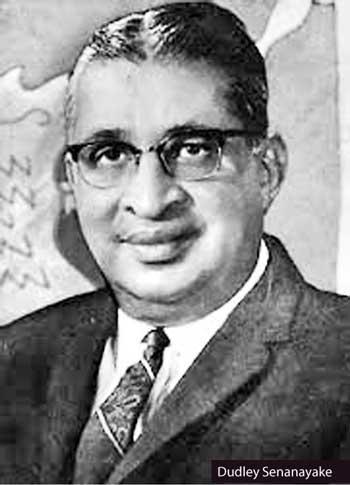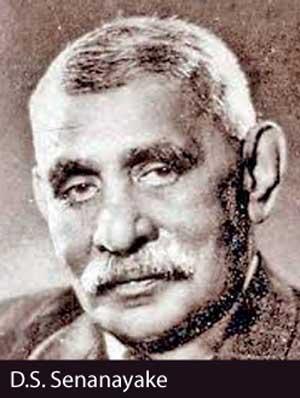13 Apr 2021 - {{hitsCtrl.values.hits}}
 New York Times on April 14, 1973, in a Colombo datelined report stated;
New York Times on April 14, 1973, in a Colombo datelined report stated;
“Dudley Senanayake, three times Prime Minister and son of a former Prime Minister, died tonight of a heart ailment. His father, Don Stephen Senanayake, formed the first Government of Ceylon (now called Sri Lanka), after it received its independence from Britain in 1947. …On the death of the elder Senanayake, in March, 1952, from injuries received in a fall from a horse, his son was called upon to form a Government. The emotional appeal of his son’s succeeding the man who had won independence was strong, and the younger Senanayake, though genuinely reluctant to accept office was pressed into acceptance. Within a week he called for elections and was returned to the head of the United National Party with a far bigger majority …. His first term as Prime Minister was brief. Seven persons were killed in leftist inspired resistance to a steep increase in the price of rice. His health broke down, and he resigned in September 1953.”
 Senanayakes of Sapitigama Korale, Bothale Walawwa were well enriched in politics by the second decade of the 20th century with brothers DC, FR and DS spearheading the Independence and temperance movements.
Senanayakes of Sapitigama Korale, Bothale Walawwa were well enriched in politics by the second decade of the 20th century with brothers DC, FR and DS spearheading the Independence and temperance movements.
Dudley Senanayake’s last term as Prime Minister was his longest, from 1965 to ‘70. The United National Party lacked a governing majority, but five other parties joined Dudley to form a coalition. Sir John Kotelawala’s UNP at the general election of 1956 sought to embrace the “Sinhala Only” policy paving way to party’s supporters in the North-East to move in favour of Federal Party leader Chelvanayagam. Dudley Senanayake assumed leadership of the party later; he was able to remedy this grave mistake and invite Tamil leaders like Chelvanayagam and Tiruchelvam to join the national government in 1965. There were Tamil, Marxist and many with divergent ideas among them making it a National Government.
His non-racist policies won respect; he gave the language of the minority Tamil community official status, despite opposition within his own party and main opposition paraded streets on January 8, 1966, shouting, “Dudlige badey masala-wadey”. Sporadic violent acts called for declaration of emergency, but Dudley remained resolute.
Once he declared “I will not barter the rights of any community for the glory of political office”, professing for an end to communal and religious squabbling. Only after he had restored communal harmony did he set out for the United States and Europe on unofficial visits, in which he discussed the prospects of aid to put the economy back on its feet.
Statesman Dudley Shelton Senanayake was one of the noblest sons of Sri Lanka. Born on June 19, 1911, a Poson Poya Day, in the village of Bothale in Mirigama in the Gampaha District, he was a genuine and compassionate politician. Dudley was the eldest son of the “Father of the Nation” late Don Stephen Senanayake, the First Prime Minister of Ceylon. Both of them, Dudley and his only brother Robert studied at the leading Anglican school, S. Thomas’ College, Mount Lavinia, where his illustrious father D. S. Senanayake had also studied from 1888 to 1902, and all three, represented S. Thomas’ College in cricket. The Head Prefect, Dudley captained cricket at the Royal-Thomian, and also excelled in Boxing, Hockey, and Athletics. He won the popular Victoria Gold Medal awarded to the Best All-Round Boy at S. Thomas’.
A Middle Temple Barrister read for Natural Sciences at Corpus Christi College in Cambridge. The young Barrister took oaths as an advocate of Supreme Court commenced practice in the chambers of H. V. Perera King’s Counsel , taking a keen interest in his practice as a lawyer but was not keen on collection of fees from clients for which he got reprimanded on many times.
Blessed with an adorable personality, Dudley Shelton, “Shelley” to close acquaints was elected joint secretary of the Ceylon National Congress [CNC] in 1940, along with J. R. Jayewardene where he became a radical who was keen on transforming the CNC into a political organisation in line with Indian National Congress. They drafted a new Constitution for CNC. The young Marxists who returned from England approached Dudley, who cherished a friendship with them, but the liberal democrat refused to accept an ideology alien to our cultural traditions. Dudley was only 24 years old when he entered politics in 1936, contesting the Dedigama seat in the State Council.
“I saw that those who sought election were all new-comers to politics. As I had decided to devote my whole life to politics, I saw here an opportunity to start early. I saw no reason why my youth should be a hindrance to an early beginning.” – [excerpt from victory address in 1936] His foreign policy was pro-western, yet he maintained good relations with communist countries such as China establishing the Ceylon-China Trade Agreement of 1952. Dudley Senanayake is respected as a statesman of democratic toleration, simplicity, and moderation. While DS was Prime Minister, Dudley served as Agriculture and Lands Minister developing Sri Lanka’s irrigation infrastructure.
Coronation of Queen Elizabeth
The Empire where the sun never sets invited Dudley, the PM of Sri Lanka to represent their Colony at the Coronation of Queen in 1952. The organisers running short of a horse carriage for one of the Heads of State had wanted our young Prime Minister [from their LIPTON’s Tea Estate?] to share the carriage with a woman diplomat of an African Colony. Dudley strongly opposed the idea; not only he declined the offer, but threatened to take the next flight home for the UK Home office bureaucracy to apologise with a ‘Our deepest regret’ saying, “It is an insult to her Majesty if you do that” for our statesman to retort , “ Officer, your suggestion is an insult to my great nation.” British authorities arranged a special carriage for Dudley. The present generation of politicians who surrender nation’s dignity before Western powers should study Senanayake policies.
The 24-year-old entered politics at the general elections held in 1936 contesting the Dedigama seat in the State Council. Making his first victory address in 1936, he said, “I saw that those who sought election were all newcomers to politics. As I had decided to devote my whole life to politics, I saw here an opportunity to start early. I saw no reason why my youth should be a hindrance to an early beginning.” He was appointed Minister of Agriculture and Land at the age of 36. He regained his seat at the elections held in 1947 under the Soulbury Constitution and continued in the same Ministry.
 He was a true liberal democrat, who would never tread any other path than that of the democratic way, through free and fair elections to gain power. He never made false promises to gain power and was known to always speak the truth. He was a man above all others, in every sense of the term. Both he and his father, the late D.S. Senanayake, the father of the Nation, have always stood for a unitary nation, where all our citizens are treated as equal citizens, irrespective of community. A statesman of simplicity, and moderation, he served the nation like a genius till his untimely death at the age of 61.
He was a true liberal democrat, who would never tread any other path than that of the democratic way, through free and fair elections to gain power. He never made false promises to gain power and was known to always speak the truth. He was a man above all others, in every sense of the term. Both he and his father, the late D.S. Senanayake, the father of the Nation, have always stood for a unitary nation, where all our citizens are treated as equal citizens, irrespective of community. A statesman of simplicity, and moderation, he served the nation like a genius till his untimely death at the age of 61.
Reading newspapers was a habit—in certain instances from hospital bed he dictated his replies. A few days prior to his death, Dudley insisted reading the newspaper when hospital staff had prevented him as it carried a vituperative statement issued by R. Premadasa of Citizen’s Front. Sensing what had transpired the insightful man became emotional and pleaded with the nurse assuring her, “Premadasa is my pet; …let him say anything, I will not take him seriously…”
His condition worsened; the statesman Dudley Senanayake closed his eyes on 13th April, on the eve of New Year in 1973. Coincidentally, the auspicious colour recommended by astrologers for the ‘celebration’ was White!
[email protected]
01 Jan 2025 4 hours ago
01 Jan 2025 4 hours ago
01 Jan 2025 5 hours ago
01 Jan 2025 6 hours ago
01 Jan 2025 6 hours ago